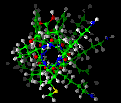 history
history history
history Jump to Background, Description, or
Examples; explanation of how commands are
documented.
Jump to Background, Description, or
Examples; explanation of how commands are
documented.
Operation Option Default Meaning
convert -xdr2his -xdr2his Convert between platform-independent (XDR) representation of the history fileand machine-dependent (FORTRAN) history file. (If no option is given, the default is used.)
Option Value Default Meaning
-xdr2his xdr_file run_name.his.xdr Use the xdr_file file as the .xdr file. his_file run_name.his Output the history information to the his_file
 Jump to Syntax, Description, or
Examples
Jump to Syntax, Description, or
ExamplesCurrently, the history command has one operation and one option. The purpose is to allow conversion of machine-independent history files into machine-dependent history files. One use of this would be to read a history file generated on a non-IEEE-compliant platform and generate a FORTRAN history file that is readable in an IEEE format (so that the Insight program can read the file).
On non-IEEE-compliant platforms, the Discover program outputs only XDR (external data representation) format history files. On IEEE platforms the Discover program outputs FORTRAN history files by default; however, if the environment variable DISCOVER_HISTORY_XDR is defined, XDR history files are written. The default file name for XDR history files is run_name.his.xdr.
 Jump to Syntax, Background, or
Examples
Jump to Syntax, Background, or
ExamplesThe history command takes an operation and options to those operations. At present, the only supported operation is convert, which takes an optional -keyword. The only -keyword supported right now is -xdr2his, which is also the the default if no -keyword is specified.
Filenames for the .xdr and .his files can be specified as optional arguments.
 Jump to Syntax, Background, or
Description
Jump to Syntax, Background, or
Description
BTCL > history convertIn this example, the history convert command looks for a file named run_name.his.xdr and generates a file named run_name.his, which is in the correct format for a Discover history file.
BTCL > history convert -xdr2his acenm.xx acenm.hhIn this example, the history convert command looks for a file named acenm.xx and generates a file named acenm.hh, which is in the correct format for a Discover history file.
 Main
access page
Main
access page  Advanced-Use access.
Advanced-Use access.
 List of BTCL commands
List of BTCL commands
 help command
help command
 minimize command
minimize command
Copyright Biosym/MSI